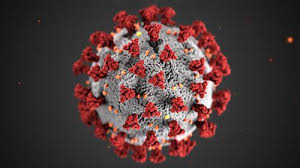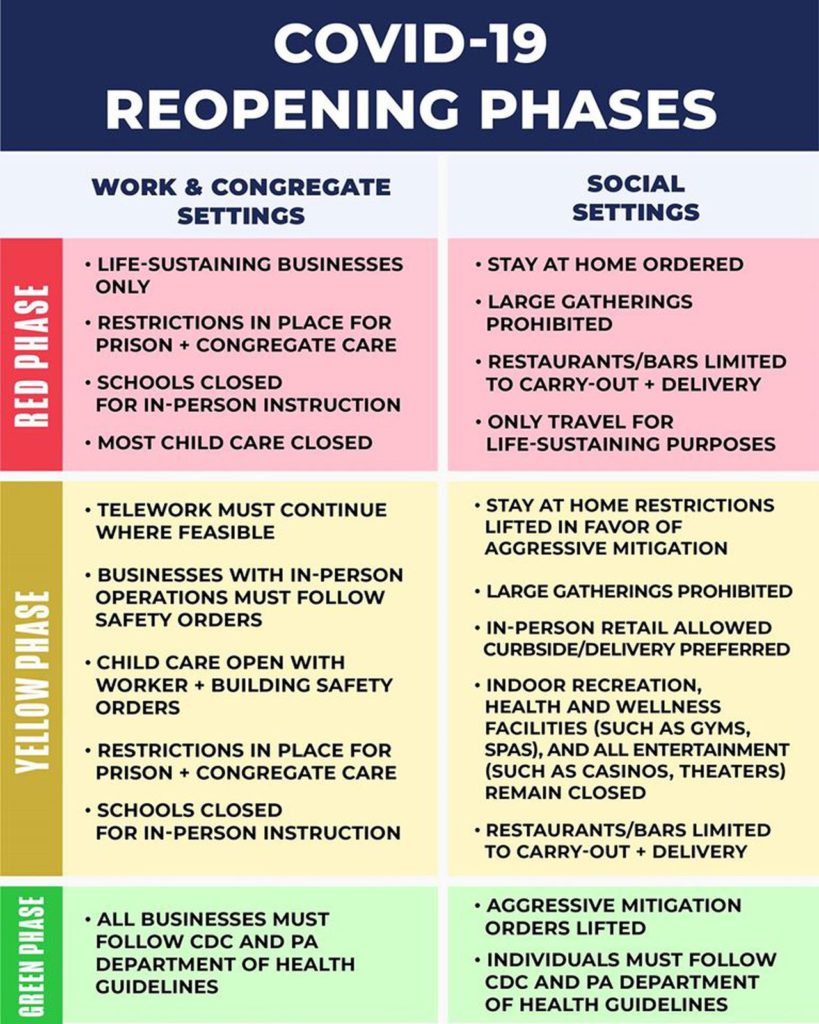
By Drew G. Miller, Esq.
Posted: May 16, 2020
Thirteen counties in Western Pennsylvania – including Allegheny, Butler, Cambria, Fayette, Washington and Westmoreland — have moved to  the“yellow” phase of Governor Tom Wolf’s process of reopening Pennsylvania.[1]
the“yellow” phase of Governor Tom Wolf’s process of reopening Pennsylvania.[1]
Many businesses in these counties are resuming in-person operations as of May 15, after being closed for nearly two months in response to the Covid-19 pandemic. However, businesses in the yellow-phase counties cannot go back to business as usual. In fact, one of the most overlooked portions of the governor’s order is that if you can work from home, you must work from home:
“All businesses …which had been conducting their operations in whole or in part remotely through individual teleworking of their employees under [the March 19, 2020 Order] may continue to conduct such operations remotely through individual teleworking of employees and may not commence in-person business operations for those employees of business functions” (emphasis added).
(To see the full text of Gov. Wolf’s March 19, 2020 Order, click here: https://www.scribd.com/document/460381373/05-07-20-TWW-Yellow-Phase-Order)
Gov. Wolf’s March 19 Order directed the closure of all businesses that are not “life sustaining.” On May 7, the governor suspended this stay-at-home order and permitted the first 24 counties in northwest and northcentral Pennsylvania to enter the “yellow” phase of his color-coded reopening plan. On May 15, Gov. Wolf added the 13 counties in Western Pennsylvania to the “yellow” phase.
 The “yellow” phase is part of the state’s three-tiered reopening plan. The other phases are the most restrictive, stay-at-home “red” phase and the least restrictive “green” phase. No counties in Pennsylvania have moved to the “green” phase.
The “yellow” phase is part of the state’s three-tiered reopening plan. The other phases are the most restrictive, stay-at-home “red” phase and the least restrictive “green” phase. No counties in Pennsylvania have moved to the “green” phase.
Under the governor’s May 7 Order, certain businesses in “yellow” counties may conduct in-person operations, “provided that the businesses fully comply with all substantive aspects of: the Order of the Secretary of Health providing for building and safety measures, issued April 5, 2020; the Order of the Secretary of Health providing for business safety measures (to keep employees and customers safe), issued April 15, 2020; and any other future applicable Department of Health (DOH) and Centers for Disease Control and Prevention (CDC) guidance.”
One such piece of guidance from the governor is titled “Guidance for Businesses Permitted to Operate During the COVID-19 Disaster Emergency to Ensure the Safety and Health of Employees and the Public” (hereafter, “Governor’s Guidance”). This document incorporates some of the previous guidance from the DOH and the CDC. The governor notes that “[a]ll businesses in all industries and sectors of the economy (including non-profit entities) in the Commonwealth, which are permitted to conduct in-person operations, are subject to this guidance unless they are otherwise more stringently regulated under separate industry-specific guidance.”
So what does moving to the “yellow” phase mean for business owners?
As previously noted, businesses that were operating remotely must continue to do so.[2], [3], [4] For other businesses that are permitted to conduct in-person operations, here is a summary of the guidance from the state and federal government to help business owners remain compliant..
Overview of the “Yellow” Phase
- Stay at home order lifted
- Businesses that were operating remotely may not commence in-person business operations
- No dine-in restaurants permitted — carry-out and delivery only
- Schools remain closed
- Child care open, but must comply with guidance
- Not allowed to gather in groups of more than 25 people
- In-person retail is permitted, but curbside and delivery is preferable
- No indoor recreation, health and wellness facilities or personal care services (gyms, spas, hair salons, nail salons, massage therapy, etc.)
- No indoor entertainment (casinos, theaters)
- People should still maintain a six-foot distance from others
- Non-essential travel should be avoided
Businesses Must Post a Covid-19 Flyer
According to the Governor’s Guidance, businesses must (1) print (2) sign and (3) post the “COVID-19 Safety Procedure for Businesses” flyer.
This flyer must be signed by the business’s corporate officer, site manager, site foreperson, or equivalent. The flyer also contains a space for the business to indicate the employee who is the “Pandemic Safety Officer” or other person in charge of Covid-19 safety procedures for the business.
The signed flyer must be posted
- in employee common space and,
- if the business serves the public, the flyer must also be posted near the business entrances in prominent locations
A legal-size (8.5” x 14”) flyer is located here: https://www.pa.gov/wp-content/uploads/2020/04/COVID-19-Reopening-Businesses-Flyer-8-5×14-1.pdf
If a business does not have access to legal-size paper and would like to print out the flyer on two 8.5” x 11” pieces of paper, it can go here: https://www.pa.gov/wp-content/uploads/2020/04/COVID-19-Reopening-Businesses-Flyer-8-5×11-1.pdf
Spanish translations are also available. To download a legal-size Spanish flyer, go here: https://www.pa.gov/wp-content/uploads/2020/04/Spanish-COVID-19-Reopening-Businesses-Flyer-8-5×14-1.pdf
To download two letter size Spanish flyers, go here: https://www.pa.gov/wp-content/uploads/2020/04/Spanish-COVID-19-Reopening-Businesses-Flyer-8-5×11-1.pdf
Businesses Conducting In-Person Operations Must Protect Their Employees
The Governor’s Guidance outlines what businesses conducting in-person operations must do to protect their employees.
- Provide non-medical masks for employees to wear at all times, or allow employees to wear their own masks, and make it mandatory to wear masks while on the work site.
- Frequently clean and disinfect high-touch areas
- Stagger work start and stop times to prevent large groups from entering and exiting the building at once
- Limit number of people in employee common areas and frequently clean these areas
- Meeting should be virtual. If an in-person meeting is required, limit the number of attendees to 10 and maintain a social distance of six feet
- Make sure employees have access to soap and water, hand sanitizer and disinfectant wipes
- Discourage non-essential visitors from entering the business
- Establish and implement a plan in case the business is exposed to a probable or confirmed case of COVID-19
With regard to the duty to “establish and implement a plan in case the business is exposed to a probable or confirmed case of COVID-19,” the Guidance specifically outlines what businesses must include in their plan if there has been an exposure to Covid-19. This plan incorporates guidance from the DOH and the CDC.
The plan, if exposure to Covid-19 occurs, must include:
- Decontaminate affected areas by:
- Closing off areas visited by the potentially infected person;
- Open outside doors and windows and use ventilation fans to circulate the air
- Wait at least 24 hours before cleaning and disinfecting the affected area
- Identify employees who were within 6 feet for 10 minutes or more with an infected — or a probably infected — person within 48 hours before the onset of symptoms of the infected person
- Any such exposed employee who remains asymptomatic should have their temperature checked by the employer; should self-monitor; wear a mask and practice social distancing
- If the employee becomes sick during the workday, the employee should immediately be sent home and the employee’s workspace should be cleaned and disinfected
- Promptly notify employees who were in close contacts of any known exposure to Covid-19 at the business, consistent with applicable confidentiality laws
- Take each employee’s temperature before entering work. Any employee with a temperature of 100.4 degrees Fahrenheit or higher should be sent home
- Inform employees that if they have symptoms (i.e., fever, cough or shortness of breath), they should notify their supervisor and stay home
It’s important to note that a business only needs to conduct the above steps – such as taking an employee’s temperature – if there has been a suspected exposure to Covid-19.
Businesses Conducting In-Person Operations Must Protect the Public[5]
The Governor’s Guidance further outlines what businesses conducting in-person operations must do to protect the public.
- Conduct business with the public by appointment only, whenever possible
- If appointment-only service is not feasible, limit the number of people inside the building to no more than 50% of the maximum occupancy
- Modify business hours so there is enough time to clean and restock
- Install shields or other barriers at registers and check-out areas or take other measures to maintain social distancing between customers and employees
- Encourage customers to use online ordering by providing pick-up or delivery options
- Designate a specific time for people at high risk, including those over the age of 65, to use the business at least once a week
- Require all customers to wear a mask. Businesses that provide medication, medical supplies or groceries must provide an alternate, no contact, means of delivering goods to customers who cannot wear a mask. People who cannot wear a mask due to a medical condition are not required to provide documentation of the medical condition.
- Limit use to every other register if a business has multiple checkout lanes. After every hour, rotate customers and employees to previously closed registers and clean the previously open registers and surrounding areas.
- Schedule handwashing breaks for employees every hour
- Assign an employee to wipe down carts and hand baskets before the customer uses it.
To view the full text of the Governor’s Guidance, go to: https://www.governor.pa.gov/wp-content/uploads/2020/05/20200504-COVID-19-Business-Guidance.pdf
For answers to frequently asked questions, be sure to view the Governor’s “Life Sustaining Business Frequently Asked Questions,” here: https://www.scribd.com/document/452553495/UPDATED-8-45-PM-May-11-2020-Life-Sustaining-Business-FAQs
To read more about the Governor’s Process to Reopen Pennsylvania, go here: https://www.governor.pa.gov/process-to-reopen-pennsylvania/
Industry-Specific Guidelines
In addition to the materials pertaining generally to businesses conducting in-person operations, the Commonwealth has implemented certain industry-specific guidelines.
For example, all residential construction projects may not permit more than four persons on the job site at any time. Commercial construction projects taking place in enclosed projects may not permit more than four persons on job sites of 2,000 square feet or less, but will allow one additional person for each additional 500 square feet over 2,00 square feet. More guidance for the construction industry can be found here: https://www.governor.pa.gov/wp-content/uploads/2020/04/20200423-Construction-Industry-Guidance.pdf
Likewise, the Department of State has issued guidelines for real estate professionals, appraisers, notaries, title companies and home inspectors, including the guidance that closings must be conducted by remote notary or powers of attorney, whenever possible. These guidelines are located here: https://www.dos.pa.gov/ProfessionalLicensing/BoardsCommissions/RealEstateCommission/Documents/Special%20Notices/Limited%20Guidance%20for%20Appraisers,%20Notaries,%20Title%20Companies,%20and%20Home%20Inspectors.pdf
Additionally, the governor has also offered guidance for vehicle transactions, which can be viewed here: https://www.governor.pa.gov/wp-content/uploads/2020/05/20200504-COVID-19-Business-Guidance.pdf
Enforcement of Covid-19 Orders
The governor has directed the following state agencies and local officials to enforce orders related to the Covid-19 pandemic to the full extent of the law:[6]
- Department of Health
- Department of Agriculture
- Department of Labor and Industry
- Pennsylvania State Police
- Local officials, using their resources to enforce closure orders within their jurisdiction
- Pennsylvania Liquor Control Board
Guidance for Businesses Issued by CDC and OSHA
Although these orders are governed by state law, the federal government has provided some guidelines to businesses that will be conducting in-person operations. For example, while there is no specific OSHA standard covering Covid-19 exposure, some OSHA requirements may apply to preventing occupational exposure, including, OSHA’s General Duty Clause (29 U.S.C. 654(a)(1)) which requires employers to furnish to each worker “employment and place of employment, which are free from recognized hazards that are causing or are likely to cause death or serious physical harm.” To view the OSHA Guidance on Preparing Workplaces for COVID-19, go here: https://www.osha.gov/Publications/OSHA3990.pdf
Furthermore, the CDC has numerous resources and guidance for businesses that are planning to conduct in-person operations. To view this guidance, and to download helpful infographics and posters, go to: https://www.cdc.gov/coronavirus/2019-ncov/community/organizations/businesses-employers.html
For more information about legal issues facing you and your business in connection with the coronavirus pandemic, contact the attorneys at Anderson & Labovitz, LLC at (412) 209-3200. Or you can email our attorneys – Adam Anderson (aanderson@palawfirm.com), Bill Labovitz (wlabovitz@palawfirm.com) and Drew Miller (dmiller@palawfirm.com). For more information about our firm, visit our website at www.palawfirm.com.
[1] https://www.governor.pa.gov/wp-content/uploads/2020/05/20200514-TWW-amendment-to-yellow-phase-order.pdf
[2] https://www.scribd.com/document/460381373/05-07-20-TWW-Yellow-Phase-Order
[3] https://www.scribd.com/document/460381371/05-07-20-SOH-Yellow-Phase-Order
[4] https://www.governor.pa.gov/wp-content/uploads/2020/05/20200504-COVID-19-Business-Guidance.pdf
[5] https://www.governor.pa.gov/wp-content/uploads/2020/05/20200504-COVID-19-Business-Guidance.pdf
[6] https://www.governor.pa.gov/wp-content/uploads/2020/05/20200504-COVID-19-Business-Guidance.pdf


